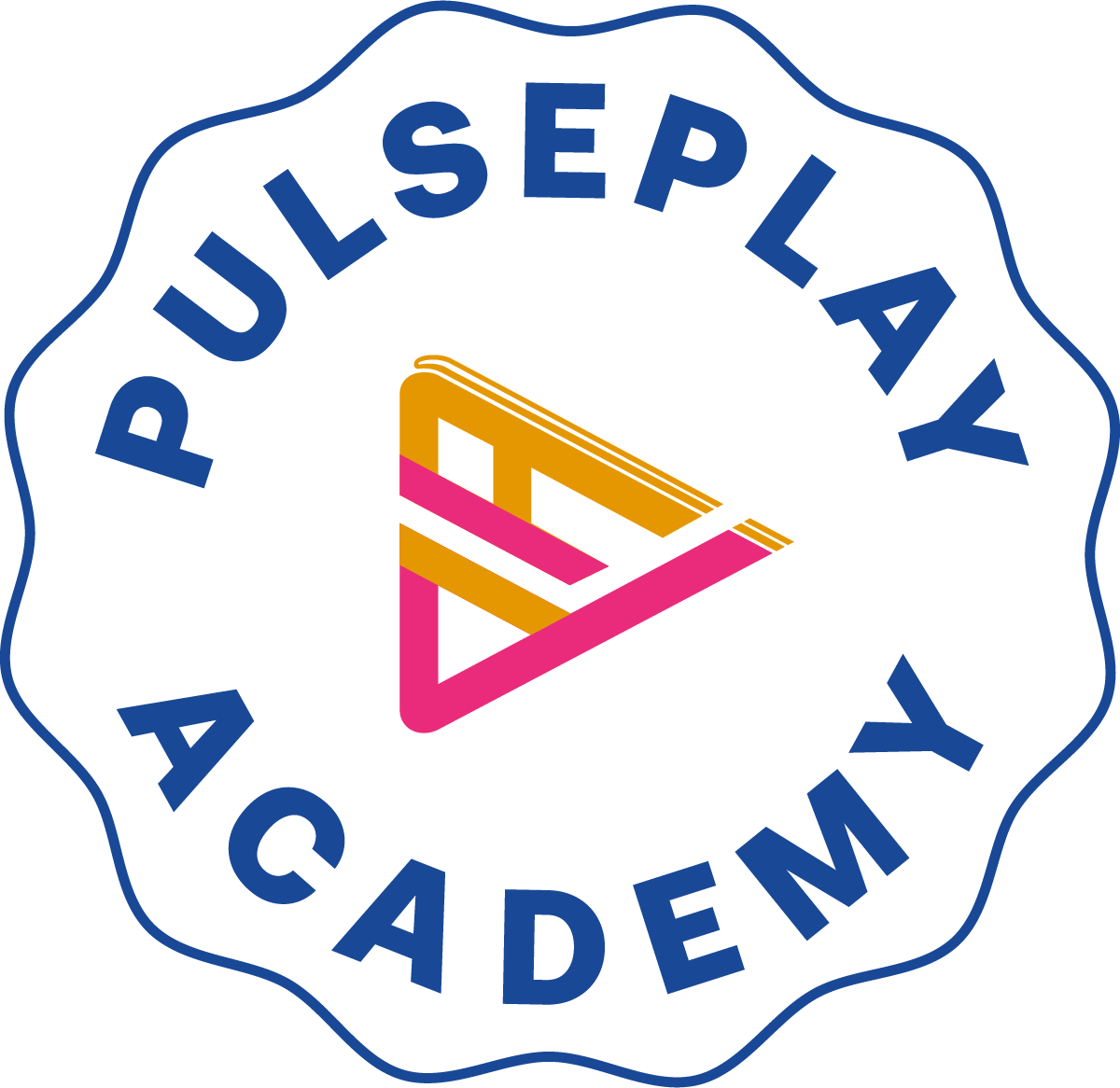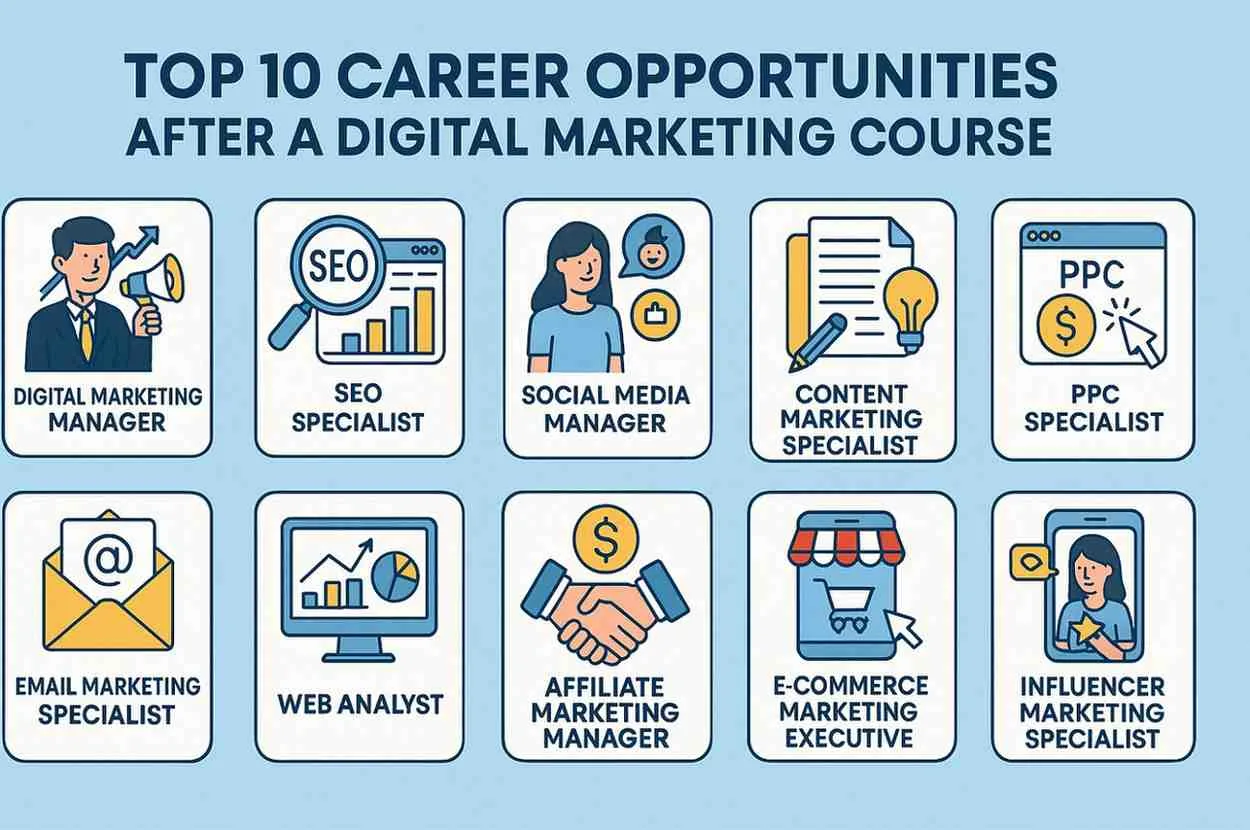Top 10 Career Opportunities After a Digital Marketing Course
In an era where online engagement is a currency more valuable than ever, digital landscapes are expanding at lightning speed. Businesses—from Himalayan hill retreats to global e‑commerce giants—are harnessing the power of online visibility, content storytelling, and data-driven decisions. That growth fuels demand for skilled professionals trained through a Digital Marketing Course, making it one of the most promising career paths of the decade.
Why is this path so compelling? A Digital Marketing Course equips learners with hands-on skills—from SEO and analytics to campaign strategy and automation—that open doors to exciting job opportunities across industries. Whether you envision crafting social narratives beneath Dharamshala’s pine canopy or managing global ad campaigns while gazing at snowy peaks, this training lays a foundation for success. Let’s explore the career after a Digital Marketing Course and why upskilling is key to unlocking your potential.
1. Digital Marketing Manager
- Roles & responsibilities
A Digital Marketing Manager oversees end‑to‑end digital strategy: managing campaigns across search, social, email, content, and display channels. They coordinate cross-functional teams, plan budgets, set KPIs, and steer brand positioning in the digital sphere. - Skills required
Strategic planning, leadership, budgeting, campaign architecture, analytics interpretation, and stakeholder communication. An understanding of SEO, PPC, social trends, and email funnels complements their toolkit. - Average salary range
Depending on the region and experience. Your earnings as a Digital Marketing Manager typically reflect both your skill and the tangible results you deliver.
2. SEO Specialist / SEO Executive
- What an SEO expert does
An SEO Specialist ensures that websites rank prominently on search engines. Their duties include keyword research, on-page optimization, backlink building, technical SEO audits, and staying updated with search algorithm changes. - The tools they use
Google Keyword Planner, Ahrefs, SEMrush, Yoast, Screaming Frog, and Google Search Console, among others. - Growth opportunities
You can evolve from SEO Executive → SEO Manager → Head of SEO or even transition into broader roles like Digital Marketing Manager or Content Strategist—all solid career paths after a Digital Marketing Course trajectory.
3. Social Media Manager
- Platforms handled
This role spans Instagram, Facebook, Twitter, LinkedIn, TikTok, YouTube, and emerging networks like Threads or BeReal. Content must be tailored to each platform’s unique community vibe. - Content and community management
Social Media Managers craft posts, visuals, stories, Reels, and responses while engaging with audiences, moderating comments, and fostering community loyalty. - KPIs tracked
Follower growth, engagement rate, reach/impressions, click-through rates, conversions, and social sentiment analysis are key indicators of success.
4. Content Marketing Specialist
- Focus on blog, video, and long-form content
Content Marketing Specialists create value-rich storytelling via blogs, guides, whitepapers, video scripts, and long-form articles that educate, engage, and convert. - Strategy and storytelling skills are needed
They must understand audience personas, content planning, narrative structure, SEO‑friendly writing, and multimedia integration—making them vital in building brand trust and authority.
5. PPC Specialist / Paid Ads Expert
- Google Ads, Meta Ads, LinkedIn Ads
PPC Specialists manage paid campaigns across Google Ads, Facebook and Instagram Ads, LinkedIn Ads, YouTube Ads, and other platforms driven by cost‑per‑click models. - Budget optimization and campaign management
They fine‑tune ad targeting, bids, keywords, creatives, A/B testing, and ROAS (Return on Ad Spend), ensuring every rupee or dollar works efficiently toward conversions.
6. Email Marketing Specialist
- Campaign setup, segmentation, automation
An Email Marketing Specialist plans email sequences—from welcome flows to lifecycle campaigns—using segmentation, personalization, triggers, and A/B testing to nurture leads and build conversions. - Tools like Mailchimp, Klaviyo, HubSpot
They leverage platforms such as Mailchimp, Klaviyo, and HubSpot to automate sends, track open rates, click-throughs, conversions, and email ROI, turning one‑to‑one messaging into scalable impact.
7. Web Analyst / Data Analyst
- Focus on Google Analytics, tracking, and reporting
Web Analysts interpret visitor behavior using tools like Google Analytics, Google Tag Manager, Mixpanel, or Hotjar. They track session flows, bounce rates, conversion paths, and UX signals. - Turning insights into action
They translate raw data into actionable recommendations—such as refining landing pages, improving user flow, adjusting ad targeting—turning insights into conversion-driving strategies.
8. Affiliate Marketing Manager
- Partner network handling
Affiliate Marketing Managers recruit, onboard, and nurture partners (influencers, bloggers, niche sites) who promote products/services on a commission basis. - Commission models and revenue growth
They design commission tiers (CPS, CPA, hybrid), monitor performance across partners, analyze channel effectiveness, and scale affiliate programs to boost revenue while managing payouts and policies.
9. E‑commerce Marketing Executive
- Product listing, catalog optimization
This role focuses on optimizing product titles, descriptions, images, meta tags, and structured data on platforms like Shopify, Amazon, or Flipkart. - Conversion funnel and upselling
They strategize on cross-selling, upselling, cart recovery emails, promotional banners, and dynamic recommendations—driving sales growth along the e‑commerce funnel.
10. Influencer Marketing Specialist
- Collaboration and partnership management
Influencer Specialists identify and negotiate collaborations with content creators across platforms. They align influencer output with brand values, campaign goals, and target audiences. - ROI tracking and brand visibility
They measure reach, engagement, conversions, affiliate link performance, and PR impact—balancing creative authenticity with data‑driven ROI.
Additional Emerging Career Paths
Beyond these established roles, a career after a Digital Marketing Course now opens doors into cutting‑edge spaces:
- AI and automation in digital marketing: Roles focused on generative content, chatbot strategy, personalization engines, and AI-driven ad optimization—where creativity meets machine intelligence.
- Voice search optimization: Specialists optimizing for voice queries via smart speakers and virtual assistants (like Alexa, Siri, Google Assistant), mastering conversational SEO and structured data.
- Metaverse marketing roles: Strategists designing brand experiences in virtual worlds, coordinating NFT drops, virtual events, in‑game ads, or augmented reality (AR) activations—blurring physical boundaries.
Conclusion
From curated storytelling to data‑driven strategies, the career after a Digital Marketing Course is as diverse as the platforms it spans. Whether you’re drawn to analytics by the mountain breeze or crafting social stories in twilight shadows, there’s a role that aligns with your strengths and aspirations. Choosing your path starts with evaluating your passions—creativity, strategy, numbers, or community—and pairing them with ongoing learning and hands‑on application.
Remember: continuous learning—via tools updates, emerging platforms, and new campaign formats—is the lifeblood of all digital marketing careers. With perseverance, practical exposure, and a Digital Marketing Course as your launchpad, you’re well‑positioned to thrive in today’s digital domain.
FAQs
1. What is the highest-paying job in digital marketing?
Typically, Digital Marketing Managers, in senior leadership or cross-channel roles, command the highest salaries—especially when driving high‑impact ROI in e‑commerce or enterprise sectors.
2. Can I get a job immediately after completing a digital marketing course?
Yes—especially if your Digital Marketing Course includes live projects, internships (like those offered via PulsePlay Digital), portfolio development, and practical assignments. Intern roles often transition into full-time positions.
3. Is digital marketing a good long-term career option?
Absolutely. Digital channels and consumer behaviors evolve constantly, making this a dynamic, growing field. With continuous upskilling (e.g., AI tools, analytics, emerging platforms), your relevance only increases.
4. Do I need a degree to start a career in digital marketing?
Not necessarily. Employers value demonstrable skills, projects, certifications, and practical experience—often more than formal degrees. A Digital Marketing Course can bridge the skills gap effectively.
5. How much can a fresher earn in digital marketing?
In India, freshers may start with ₹2–4 LPA, depending on location and role.
6. Which companies hire digital marketing professionals?
Agencies, startups, e‑commerce platforms, travel brands, health-tech firms, educational institutes, and even NGOs all seek digital marketing talent for roles ranging from SEO to paid ads, content, and analytics.
7. Can I work as a freelancer in digital marketing?
Yes—many professionals begin freelance careers offering SEO audits, social media management, content strategies, PPC setup, or email campaigns. Freelancing lets you build versatility, client relationships, and autonomy.
8. How long does it take to become job-ready in digital marketing?
With immersive courses and projects, many learners become job-ready within 3–6 months. Internships (such as with PulsePlay Digital post‑course) accelerate readiness through live campaigns and mentorship.
9. Is coding required for a career in digital marketing?
Not typically. Basic HTML/CSS can help with content formatting or on-page SEO, but most roles rely on platforms, analytics tools, and CMS interfaces—no deep coding skills needed unless you’re pursuing technical marketing or web development roles.
10. What certifications are most valuable in digital marketing?
Google Analytics Individual Qualification (GAIQ), Google Ads certification, Facebook Blueprint, HubSpot Content or Inbound marketing certificates, SEMrush or Ahrefs SEO certifications, and Mailchimp or HubSpot email automation credentials all bolster your credibility and employability.


